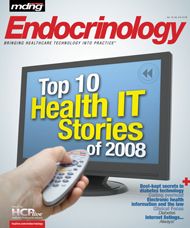Publication
Article
MDNG Endocrinology
Best-kept Secrets in Diabetes Technology
Author(s):
New technologies are improving the lives of people living with diabetes.
Type 1 diabetes mellitus is the third most common childhood disease, behind allergies and asthma. Until the discovery and purification of insulin in the 1920s, it was universally fatal. Though we now have insulin, it’s certainly not a cure; however, new technologies are improving the lives of people living with diabetes.
ARTIFICIAL PANCREAS
The Juvenile Diabetes Research Foundation (JDRF) made national headlines in 2006 by proclaiming, “Perfecting a closed loop artificial pancreas is one of JDRF’s therapeutic goals.” Ultimately, a true artificial pancreas will enable a person with diabetes to maintain normal glucose levels by automatically providing the right amount of insulin at the right time, just as the pancreas does in non-diabetic individuals, and thus essentially offering a cure for diabetes. It bridges a continuous glucose-monitoring system as the input arm with continuous insulin infusion as the output arm, which will lead to automatic normalization of the blood sugars, without need for human interference. Ideally, this device will be implantable.
This news has not received the attention that it deserves for a number of reasons. There is a lack of appreciation for the fact that juvenile diabetes affects close to one out of 100 children. Many people fail to recognize that insulin is not a cure for this disease. Further, many people do not fully understand the value of the artificial pancreas.
JDRF is launching an aggressive campaign to speed regulatory approval and obtain health insurance coverage through Medicare, Medicaid, and private payers for artificial pancreas technologies. They are commissioning research to show cost-effectiveness and improved blood sugar control of patients using these technologies. The foundation is also engaging in an active dialogue with the FDA to help speed the adoption of patient-oriented standards to allow for a track toward regulatory approval. Most importantly, they are encouraging clinician use of these technologies.
There are already specific early prototypes of the artificial pancreas undergoing human studies. Dr. Bruce Buckingham in Stanford, CA has developed an “automated pump shut-off model.” He conducted a study in which the insulin pump was programmed to “shut-off ” for 90 minutes in response to a glucose sensor alerting it to a pending low blood sugar level. This was effective in preventing 91% of low blood sugar events, the complications feared most by parents of diabetics.
E-PRESCRIBING WITH RXNT
RxNT is an innovative, robust electronic prescribing system that was formed by a partnership between Medco, Express Scripts, and SureScripts. A practitioner logging securely into RxNT selects a patient-populated form from the practitioner’s billing system or enters a new patient into the system. The RxNT system will automatically run a real-time patient eligibility check and retrieve patient-specific formulary information. It will also retrieve claims and medication history, so that the practitioner can actually see which prescriptions were filled and when. The system will alert the practitioner if he or she selects a non-formulary medication. Retail and mail-order pharmacies will receive electronic prescriptions (or faxes if they are not capable of receiving electronic prescriptions) from RxNT. Many pharmacies actually transmit renewal requests electronically to participating RxNT practitioners. The system interfaces directly with Caremark, Medco, and Express Scripts, the three largest mail-order pharmacies.
Such a system saves time for the practitioners, who can quickly authorize electronic renewal requests from retail pharmacies, rather than rely on phone calls or faxes. And the ability to easily transmit electronic prescriptions even to mail-order pharmacies drastically reduces phone calls and faxes from pharmacies. Furthermore, RxNT provides real-time formulary information, allowing the practitioner to avoid call-backs from the pharmacy or patient to switch to formulary alternatives.
RxNT is the first to achieve GoldRx Advanced Certification from SureScripts. Many health IT experts believe that the electronic link between a physician and a pharmacist is the most critical and most achievable first step toward broader healthcare interoperability.
Dr. Newmark is the editor-in-chief of MDNG: Pediatrics Edition, and a pediatric endocrinologist at Saint Barnabas Medicasl Center in Livingston, NJ.






